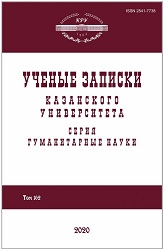Представления об идеальном гражданине в период кризиса Римской республики на примере образа Катона Цензора
Representations about an Ideal Citizen during the Crisis of the Roman Republic Using the Example of Cato the Elder
Author(s): Alik Olegovich KudratovSubject(s): Civil Society, Political history, Social history, Social Norms / Social Control
Published by: Казанский (Приволжский) федеральный университет
Keywords: civic values; Roman value system; Cato the Censor; Cato the Elder; Cicero; vir bonus; ideal citizen; crisis of the Roman Republic; virtus; valor; virtue;
Summary/Abstract: The problem of Roman civic values was considered through the prism of the ideal citizen image. The moral relativism of the Roman society was noted: the hard-edged boundaries of what is allowed are deterred by the authority of an ideal citizen. In addition, the appeal to morality was the basic tool of the main Roman political practice – speeches. At the same time, the quintessence of Roman morality was the ideal citizen image embodied in certain Romans. Along with the appeal to morality, the reference to the actions of a recognized Roman was a powerful argument in both political and judicial disputes. Based on the fact that the Romans recognized a certain historical person, Cato the Elder, throughout the history of both Republican and Imperial Rome, the complexes of virtues inherent in the ideal citizen image were analyzed. The results of this analysis expressed in the sets of virtues were helpful in solving the problem of the set of virtues necessary for the recognition of a citizen as ideal, which has been posed in historiography. Using the references to Cato the Elder in the sources, it was revealed that the terms of virtues are not crucial in the recognition of a Roman citizen as ideal.
Journal: Ученые записки Казанского университета. Серия Гуманитарные науки
- Issue Year: 162/2020
- Issue No: 3
- Page Range: 72-83
- Page Count: 12
- Language: Russian

